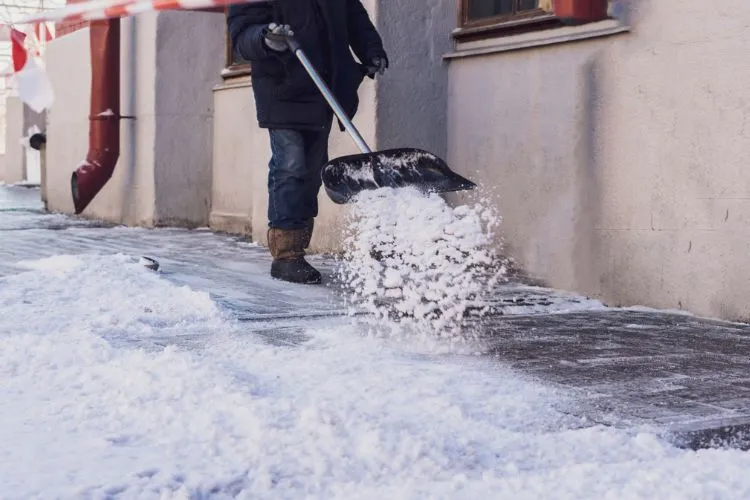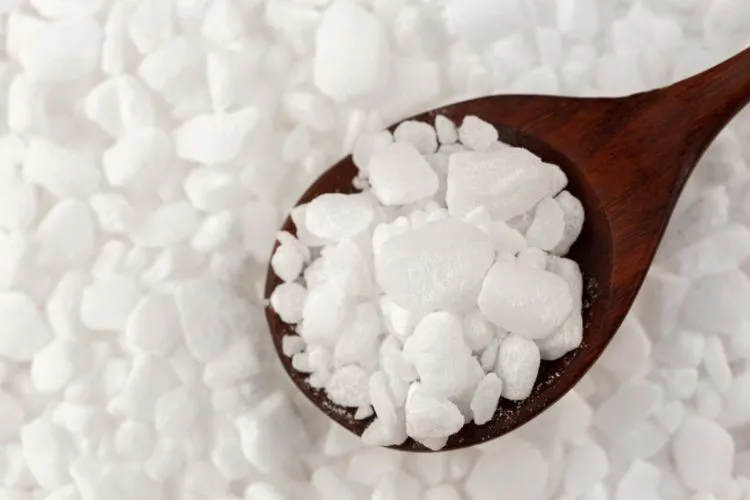When winter storms hit and ice blankets our surroundings, finding a quick, effective method for ice removal becomes a top priority.
While many people reach for the standard ice melt products that fill store shelves, you might wonder if the bag of water softener salt sitting in your home can do the trick.
So, can you use water softener salt to melt ice?
This article explores the potential use of water softener salt for melting ice, comparing it to traditional methods and offering practical advice.

💦 What is Water Softener Salt?
Water softener salt is primarily used to remove minerals from hard water in homes and industries. It comes in various forms, including pellets and crystals, and is key to ensuring water softeners function properly.
💦 Can You Use Water Softener Salt To Melt Ice?
At its core, water softener salt is still salt, mainly composed of sodium chloride, which is the same component used in many traditional ice melts. Salt works to melt ice by lowering the water’s freezing point.
When salt is applied to ice, it begins to dissolve and temporarily turns the ice into liquid water, preventing it from refreezing under normal weather conditions.
💦 How Effective is Water Softener Salt Compared to Regular Ice Melt?
Considering effectiveness, water softener salt does work to melt ice but may not perform as efficiently as products specifically designed for that purpose.

Traditional ice melts often contain a mix of different salts like magnesium chloride and calcium chloride, which can work at lower temperatures and more quickly than sodium chloride alone.
Water softener salt typically melts ice effectively when the temperatures are around or just below 32 degrees Fahrenheit. If the thermometer dips lower, its effectiveness can diminish.
Advantages of Using Water Softener Salt
One of the biggest benefits of using water softener salt is its cost-effectiveness. It is generally less expensive than specialized ice melt blends.
Plus, it’s readily available, which means during a particularly harsh winter where ice melt can become scarce on store shelves. Water softener salt is often still available because it is stocked for a different purpose.
Drawbacks and Considerations
While the idea of a dual-purpose salt might seem appealing, there are drawbacks.
Water softener salt often comes in larger, chunkier crystals which can take longer to begin working when compared to the finer grains of most ice melts designed specifically for quick melting.
Another consideration is its impact on the environment and surrounding materials. Like many salts, it can be harsh on concrete and plants, and while its safety for pets is slightly better than some ice melting alternatives, it’s still a chemical compound that they should not ingest.
💦 Practical Tips for Using Water Softener Salt on Ice
If you choose to use water softener salt for melting ice, there are a few strategies to follow. Start by spreading a thin layer evenly over the icy areas.
Since the crystals are larger, they won’t cover as much area as finely ground salt, so you may need to break them down for broader coverage.
After application, give it some time to work. If temperatures are close to freezing, you may see results quickly, but in colder weather, it may take more time.

💦 Environmental Impact of Using Salt for Ice Control
The environmental impact of using salts, including water softener salt, for ice control can be significant, affecting ecosystems and waterways in various ways:
- Water Pollution: Salts can leach into groundwater and surface water, increasing salinity levels. This can harm aquatic life by disrupting their osmoregulation processes.
- Soil Degradation: Increased salt concentrations in the soil can inhibit plant growth by altering soil structure, reducing fertility, and preventing water absorption.
- Wildlife Impact: Animals may ingest harmful amounts of salt from the environment, leading to health issues. Additionally, salt can attract wildlife to roads, increasing the risk of vehicle collisions.
- Ecosystem Imbalance: High salinity levels can lead to a decrease in biodiversity, as only salt-tolerant species will thrive, thus altering natural habitats and food webs.
Understanding these impacts is crucial for developing more sustainable methods of ice control that minimize harm to our ecosystems and waterways.
💦 User Experiences and Testimonials
User experiences with water softener salt for ice melting offer varied perspectives on its effectiveness:
- Effective in a Pinch: “After a sudden freeze, I ran out of regular ice melt. The water softener salt in my garage seemed to work well enough, although it took a bit longer to kick in,” shared Emily from Michigan.
- Concern for Pets: Michael from Colorado noted, “I was worried about my dogs’ paws. Even though it wasn’t the pet-safe ice melt, they didn’t show any immediate discomfort.”
- Uneven Results: “Some chunks didn’t dissolve as quickly, leading to patchy spots. I had to break them up for more even coverage,” reported Sarah in Maine, highlighting a common challenge.
💦 Frequently Asked Questions (FAQs)
Will water softener salt damage concrete?
Yes, just like traditional ice melt products, water softener salt can damage concrete over time. It can cause scaling and spalling due to the freeze-thaw cycles it creates in the concrete. Using it sparingly or choosing ice melt products that are designed to be less harsh on concrete might be better options.
Is water softener salt safe for pets?
It is safer than some other chemical de-icers, but it is not entirely safe for pets. If pets walk on the salt, it can dry and crack their paws. If they ingest it by licking their paws, it can be harmful. Always clean your pet’s paws after they come inside if you’ve used any de-icing products.
Can you use pool salt to melt ice on driveways?
Like water softener salt, pool salt mainly consists of sodium chloride and could technically melt ice. However, similar effectiveness and environmental impact considerations apply, making it less ideal than products specifically designed for de-icing.
Conclusion:
While not the most efficient choice for melting ice, water softener salt is a viable option if other products are unavailable.
Understanding its characteristics, effectiveness, and the best ways to apply it can help ensure better safety and convenience during the icy winter months.
Have you tried using water softener salt to clear ice? Let us know how it worked for you!

Devon Shorts, a seasoned expert with over a decade of experience in water safety, shares valuable insights on this blog “Aqua Safety Plus”. Trust his expertise to keep your water clean and your family safe.
